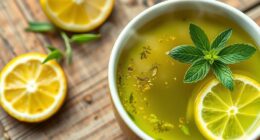Lately, I’ve developed a fascination with turmeric tea and the advantages it offers for health. For centuries, turmeric has found its place in culinary practices and traditional healing methods. However, it is only in the recent past that Western research has begun to acknowledge and investigate the health-promoting potential of this vibrant yellow spice.
As a result, turmeric has become increasingly popular as a supplement and ingredient in various foods and drinks. In this article, I’ll delve into the world of turmeric tea.
I’ll discuss the recommended daily intake of turmeric, factors that can affect your intake, how many cups of turmeric tea you can safely consume in a day, potential side effects of consuming too much turmeric, how to prepare this delicious drink at home, tips for incorporating it into your diet, alternative ways to consume turmeric, and precautions when drinking it.
So grab a cup of tea (turmeric or otherwise) and let’s get started!
Key Takeaways
- Turmeric tea is becoming increasingly popular due to its potential health benefits, including reducing inflammation, improving digestion, and boosting the immune system.
- While there is no official guideline on daily intake, most people can consume up to 500mg per day, with a recommended daily limit of three cups per day.
- It is important to consult with a healthcare professional before adding turmeric tea to your routine, as it may interact with certain medications and dietary restrictions may apply.
- To prepare turmeric tea, use high-quality ingredients and avoid adding too much sweetener or dairy products.
The Benefits of Turmeric Tea for Your Health
You’ll be amazed at how many health benefits you can reap from drinking turmeric tea, including reducing inflammation, improving digestion, and boosting your immune system. Turmeric is a spice that has been used for centuries in traditional medicine to treat a variety of ailments. Drinking turmeric tea regularly can help alleviate symptoms of arthritis, asthma, and even depression.
Turmeric tea recipes are easy to find online or you can make your own by adding turmeric powder to hot water with some honey or lemon juice for added flavor. The best time to drink turmeric tea is in the morning on an empty stomach or before bed as it helps improve digestion and aids in sleep. However, it’s important to note that excessive consumption of turmeric tea may lead to side effects such as nausea and dizziness.
Understanding the recommended daily intake of turmeric is crucial when incorporating it into your diet. While there is no established daily intake for adults, research suggests that consuming up to 500 milligrams per day is safe for most people. It’s important to consult with a healthcare provider before consuming large amounts of any supplement or spice as it may interact with medications or have adverse effects on certain individuals.
Understanding the Recommended Daily Intake of Turmeric
It’s important to know the appropriate amount of turmeric to consume daily for optimal benefits. Here are some key points to consider when it comes to taking turmeric tea:
-
Turmeric tea is a great way to incorporate this spice into your daily routine and reap its health benefits.
-
The recommended dosage for weight loss is 500mg, which is equivalent to about one teaspoon of fresh or ground turmeric per day.
-
While supplements can provide higher doses, they may not be as effective as consuming turmeric in its natural form through foods or drinks like turmeric tea.
-
It’s important to consult with your healthcare provider before adding any new supplement or food into your diet.
When it comes to incorporating turmeric into your diet, there are different ways you can do so. Some people prefer supplements while others opt for turmeric tea or cooking with fresh or ground turmeric. However, it’s important to keep in mind that the dosage and effectiveness may vary depending on the method you choose.
In the next section, we’ll look at factors that affect your daily intake of turmeric. These include things like age, weight, and overall health status. By understanding these factors, you can make informed decisions about how much turmeric you should consume on a regular basis.
Factors That Affect Your Daily Intake
As I consider my daily intake of turmeric, it’s important to understand the factors that can affect this. Age, weight, and current health conditions all play a role in determining how much turmeric I should consume each day.
By taking these factors into account, I can make informed decisions about incorporating turmeric into my diet and ensure that I’m reaping its benefits safely and effectively.
Age
If you’re concerned about your age and how much turmeric tea you can consume, don’t worry. It’s safe to have up to three cups a day as long as it doesn’t interfere with any medications or pre-existing conditions.
In fact, turmeric tea has been found to provide numerous benefits for skin health, such as reducing inflammation and improving overall complexion. Additionally, athletes may find that drinking turmeric tea can aid in post-workout recovery by decreasing muscle soreness and promoting faster healing.
However, it’s important to note that the amount of turmeric tea one should consume may vary depending on individual factors such as weight and overall health. It’s always best to consult with a healthcare professional before incorporating large amounts of any new food or drink into your diet.
Speaking of weight, let’s move on to explore how this factor can also affect your daily intake of turmeric tea.
Weight
Want to maximize the benefits of this delicious drink? Consider your weight – incorporating turmeric into your diet can have different effects depending on your individual body composition.
For those looking to lose weight, turmeric tea can be a great addition to their daily routine. Studies have shown that curcumin, the active ingredient in turmeric, may help boost metabolism and aid in weight loss. However, it’s important to note that the effectiveness of turmeric tea for weight loss may vary based on an individual’s starting weight and overall health.
It’s always best to consult with a healthcare professional before implementing any new dietary changes or supplements into your routine. With that being said, incorporating turmeric tea into a balanced diet and exercise plan may provide an additional boost for those looking to shed some pounds.
As we move onto discussing potential health conditions related to consuming turmeric tea regularly, it’s important to keep in mind how factors such as age and weight can play a role in its effectiveness.
Health Conditions
Maintaining good health is important, and one way to do so is by incorporating natural remedies into your daily routine. Turmeric supplements have many health benefits, such as reducing inflammation and improving brain function. The active ingredient in turmeric, curcumin, has been shown to potentially aid in the treatment of certain health conditions.
However, it’s important to note that turmeric can interact with certain medications and dietary restrictions may apply. For example, if you’re taking blood thinners or have a history of gallbladder problems, you should consult with a healthcare professional before adding turmeric supplements to your diet. Always read product labels and follow recommended dosages for safe consumption.
As for how many cups of turmeric tea you can safely consume in a day, let’s explore that next.
How Many Cups of Turmeric Tea Can You Safely Consume in a Day?
You can safely enjoy up to three cups of delicious turmeric tea a day, giving your body all the benefits it needs without overdoing it. Consuming more than this could lead to potential side effects that we will discuss in the following section. When considering turmeric tea frequency and daily limit, it’s important to remember that moderation is key.
To understand why there is a recommended daily limit for turmeric tea consumption, let’s take a look at some of the effects of excessive turmeric consumption. While turmeric is known for its anti-inflammatory properties and ability to reduce oxidative stress, consuming too much can cause stomach upset, diarrhea, and even nausea. Additionally, high doses of turmeric have been linked to liver problems in some individuals.
It’s important to note that everyone’s body reacts differently to different substances, so what might be safe for one person may not be for another. However, by sticking to a maximum of three cups per day you can still reap the benefits of this amazing spice without putting your health at risk. With that said, let’s move on to potential side effects of consuming too much turmeric.
Potential Side Effects of Consuming Too Much Turmeric
I hope you found the previous subtopic informative on how many cups of turmeric tea you can safely consume in a day. While turmeric is a superfood with many health benefits, it’s also important to be aware of the potential side effects of consuming too much of it.
Turmeric overdose may cause symptoms such as nausea, diarrhea, dizziness, and headaches. Therefore, balancing your intake is crucial. It’s recommended that adults consume no more than 1.5-3 grams of turmeric per day. This equates to about 1/2 – 1 teaspoon of ground turmeric or up to two cups of turmeric tea daily.
If you’re taking any medications or have any medical conditions, it’s always best to consult with your doctor before increasing your intake. In order to avoid experiencing any negative side effects from consuming too much turmeric, monitor your body’s response and adjust accordingly.
Balancing your intake by alternating days where you consume turmeric tea or incorporating other anti-inflammatory foods into your diet can help ensure that you receive the maximum benefits without overdoing it. Now that we’ve discussed the potential side effects of consuming too much turmeric and ways to balance our intake, let’s move onto learning how to prepare a delicious cup of turmeric tea!
How to Prepare Turmeric Tea
I love preparing turmeric tea because it’s easy and quick to make. To make a cup of turmeric tea, I only need three ingredients: turmeric powder, honey, and water.
Following a few simple directions, I can have a warm and comforting cup of turmeric tea in just a matter of minutes.
Ingredients
Turmeric tea is made with a blend of spices, including turmeric, ginger, and black pepper. These ingredients not only add flavor to the tea but also provide numerous health benefits.
Here are some key ingredients found in turmeric tea:
- Turmeric: This spice contains curcumin, which has anti-inflammatory properties that may help reduce pain and inflammation.
- Ginger: Gingerol, an active compound in ginger, is known for its anti-inflammatory effects and may help relieve nausea.
- Black Pepper: Piperine, a component in black pepper, enhances the absorption of curcumin from turmeric.
- Cinnamon: This spice has antioxidant properties and may help regulate blood sugar levels.
- Honey: A natural sweetener that contains antioxidants and has antibacterial properties.
When preparing turmeric tea, it’s important to consider factors such as daily intake and safe consumption. While there are no official guidelines on how much turmeric tea you should drink per day, most sources suggest consuming 1-2 cups daily.
It’s important to note that excessive intake may lead to side effects such as stomach upset or diarrhea. As with any supplement or herb, it’s recommended to speak with your healthcare provider before adding turmeric tea into your routine.
Now that we know more about the key ingredients in turmeric tea and their potential health benefits, let’s move onto discussing the preparation process for this delicious beverage.
Directions
To make a delicious cup of turmeric tea, start by combining your favorite blend of spices in a small pot with water and bring it to a boil. I like to use cinnamon, ginger, black pepper, and honey along with turmeric for added flavor and health benefits.
Once the mixture has come to a boil, reduce the heat and let it simmer for about 10 minutes. Then strain the tea into your cup and enjoy.
If you’re looking for alternative recipes or turmeric tea variations, there are plenty of options out there. Some people like to add milk or coconut milk to their turmeric tea for a creamier taste. Others prefer adding lemon or lime juice for an extra zingy kick.
Experimenting with different ingredients can be fun and help you find your perfect cup of turmeric tea. When incorporating turmeric tea into your diet, there are some tips that may be helpful. For example, aim to drink at least one cup per day to reap its potential health benefits.
Additionally, try drinking it after meals as it may aid in digestion. With these tips in mind, sipping on a warm cup of turmeric tea can be both delicious and beneficial for your overall wellness.
Tips for Incorporating Turmeric Tea into Your Diet
Want to spice up your daily routine and reap the health benefits of turmeric? Try incorporating a cup or two of this flavorful tea into your diet!
Turmeric tea is not only delicious, but it also contains powerful anti-inflammatory properties that can help reduce inflammation in the body. To make your turmeric tea experience even more enjoyable, try experimenting with different flavor variations such as adding ginger or honey.
One of the best times to drink turmeric tea is in the morning. Not only will it give you a boost of energy to start your day, but it can also aid in digestion and improve overall gut health.
Another great time to enjoy a cup of turmeric tea is before bed. The anti-inflammatory properties in turmeric can help reduce joint pain and swelling while promoting relaxation for a better night’s sleep.
Incorporating turmeric tea into your daily routine doesn’t have to be complicated. Simply boil some water, add a teaspoon or two of ground turmeric, and let it steep for 5-10 minutes. You can also mix in other ingredients like cinnamon or black pepper for added flavor and health benefits.
If drinking hot tea isn’t your thing, try making iced turmeric tea by letting it cool down and adding ice cubes. Alternatively, you can add turmeric powder to smoothies or use it as a seasoning on roasted vegetables for another way to consume this powerful spice.
Alternative Ways to Consume Turmeric
Incorporating turmeric tea into my daily routine has been a game-changer for my health. However, drinking the same thing every day can become monotonous. That’s why I’ve started exploring alternative ways to consume turmeric.
One way to mix things up is by taking turmeric supplements. These come in various forms such as capsules and gummies, making it easy to incorporate into your daily routine. Just make sure to follow the recommended dosage on the label and consult with a healthcare professional before starting any new supplement regimen.
Another option is to try making turmeric milk, also known as golden milk. This warm and comforting beverage combines turmeric with other spices like cinnamon and ginger for added flavor and health benefits. Simply heat up some milk of your choice, add in the spices, and enjoy!
Here are some more ideas for incorporating turmeric into your diet:
- Add it to smoothies or juices
- Sprinkle it onto roasted vegetables
- Use it as a seasoning for rice dishes
Now that we’ve explored alternative ways to consume turmeric, let’s discuss precautions when consuming turmeric tea.
Precautions When Consuming Turmeric Tea
Before I continue discussing the benefits of turmeric tea, let me first emphasize the importance of precautions when consuming it. As an AI language model, I don’t recommend taking turmeric supplements or drinking turmeric tea without consulting a healthcare professional.
Turmeric may interact with certain medications and isn’t recommended for pregnant and lactating women due to limited research on its safety.
Possible Drug Interactions
Beware of possible drug interactions when consuming turmeric tea, as it could have detrimental effects on your health. Turmeric can interact with certain medications such as blood thinners, diabetes medication, and stomach acid reducers. It’s important to speak with a healthcare provider before incorporating turmeric tea into your daily routine.
Moreover, taking excessive amounts of turmeric can lead to side effects such as upset stomach, nausea, and diarrhea. The recommended dosage for turmeric tea is 1-2 grams per day. It’s also important to take precautions when preparing the tea by using high-quality ingredients and not adding too much sweetener or dairy products.
By being aware of these interactions and following the recommended dosage, you can safely enjoy the benefits of turmeric tea.
Moving forward, let’s discuss how pregnant and lactating women should approach consuming turmeric tea in the next section.
Pregnant and Lactating Women
Well, congratulations on your new bundle of joy! But let’s be real, you probably have a million and one questions about what you can and cannot consume during pregnancy and lactation.
If you’re wondering whether turmeric tea is safe to drink while pregnant or breastfeeding, the answer is that it’s generally considered safe in moderate amounts. However, it’s always best to consult with your healthcare provider before consuming any herbal supplements.
Here are some dosage recommendations and precautions for women’s health when it comes to drinking turmeric tea during pregnancy and lactation:
- Stick to no more than 1-2 cups per day
- Avoid taking turmeric supplements in high doses
- Turmeric may stimulate contractions so avoid using if you have a history of miscarriage
- Breastfeeding mothers should also limit their intake as there isn’t enough research on how much is safe for infants
Overall, turmeric tea has numerous benefits for women’s health. It has anti-inflammatory properties that can help with discomfort during pregnancy, aids digestion which can be helpful postpartum, and boosts immune function which is beneficial for both mother and baby. However, as with any supplement or herb during pregnancy or lactation, it’s important to err on the side of caution and consult with your healthcare provider before consuming.
Frequently Asked Questions
Can turmeric tea be consumed during pregnancy?
Can turmeric tea be consumed during pregnancy? It’s a common question among expecting mothers. While turmeric has numerous health benefits, it’s important to exercise caution when consuming it during pregnancy. Some studies suggest that consuming high doses of turmeric may increase the risk of miscarriage or premature labor. However, if consumed in moderate amounts, turmeric can provide relief from morning sickness and inflammation.
Pregnant women should consult with their healthcare provider before adding turmeric tea to their diet. As with any herbal supplement or medication, it’s crucial to understand the benefits and risks associated with its consumption. If approved by a doctor, pregnant women can try safe and delicious recipes like golden milk or ginger-turmeric tea for added health benefits.
Can turmeric tea be harmful for people with liver problems?
As someone with liver problems, I’ve wondered whether turmeric tea is safe for me to consume. While turmeric has anti-inflammatory and antioxidant properties, it can interact with certain medications and potentially cause liver damage in high doses. Therefore, it’s important to speak with a healthcare provider before incorporating turmeric tea into your diet.
Additionally, pregnant individuals should consult their doctor before consuming turmeric tea as some studies suggest it may increase the risk of miscarriage or preterm labor.
Ultimately, while turmeric tea can have potential health benefits, it’s crucial to prioritize safety and consult with a medical professional before consuming it regularly.
Can turmeric tea be consumed with other medications?
When it comes to consuming turmeric tea with other medications, it’s important to consult with a healthcare provider. Turmeric may interact with certain medications, such as blood thinners and diabetes medications.
Additionally, the dosage of turmeric tea should also be considered when taking into account potential interactions with medication. The recommended daily dose of turmeric is generally 500-2000mg per day, which can be consumed through supplements or in food/beverage form such as turmeric tea. However, this dosage may need to be adjusted for individuals who are taking medication or have underlying health conditions.
It’s always best to speak with a healthcare provider before incorporating new supplements or foods into your daily routine.
How long does it take to see the benefits of turmeric tea?
Seeing the benefits of turmeric tea can take some time, but it’s worth the wait. It’s like planting a seed and waiting for the plant to grow; you need patience before you can reap the rewards.
Studies have shown that turmeric has anti-inflammatory and antioxidant properties, which can help with various health issues such as arthritis, diabetes, and even cancer prevention. However, it’s important to note that the benefits timeline may vary from person to person depending on their health condition and dosage recommendations.
To see significant changes in your body, it’s recommended to consume turmeric tea daily for at least 4-8 weeks. It’s always best to consult with a healthcare provider before adding any new supplement or medication to your routine.
Is it safe to consume turmeric tea on an empty stomach?
Yes, it’s generally safe to consume turmeric tea on an empty stomach. In fact, drinking turmeric tea first thing in the morning can kickstart your digestive system and promote digestive health. Turmeric has powerful anti-inflammatory properties and high antioxidant content, making it a natural remedy for various ailments. However, don’t overdo it with consumption as excessive amounts may cause nausea or diarrhea. Aim for 1-2 cups of turmeric tea per day and use fresh or ground turmeric root with black pepper for optimal absorption of curcumin, the active ingredient responsible for its many health benefits.
Conclusion
Overall, turmeric tea can be a great addition to your diet due to its various health benefits. However, it’s important to understand the recommended daily intake and factors that may affect how much you should consume. Based on current research, it’s safe to drink up to three cups of turmeric tea per day.
It’s important to note that consuming too much turmeric can lead to potential side effects such as stomach upset or even an increased risk of bleeding. As with any dietary supplement, it’s important to consult with your healthcare provider before adding large amounts of turmeric into your diet.
For example, a hypothetical case study could involve someone who suffers from chronic inflammation and joint pain. They begin incorporating two cups of turmeric tea into their daily routine and notice a significant decrease in their symptoms after a few weeks. This individual should still monitor their intake and speak with their doctor about any potential concerns, but overall the use of turmeric tea has been beneficial for them.










